

In October 2018, Katherine Hayes and her husband Thomas were in Philadelphia for an evaluation in preparation for Thomas’ upcoming lung transplant at the Hospital of the University of Pennsylvania. It was the first of ten trips the family would take over the next nine months, making a three-hour, 200-mile trek from their hometown in Long Island, NY. In that time, Thomas would spend many long days at the Penn Transplant Institute undergoing evaluations, physical exams, and consultations as a multidisciplinary team of nurse coordinators, social workers, pulmonologists, and surgeons worked to determine his eligibility for the transplant.
The process was sometimes as daunting for Katherine as it was for Thomas. But at the end of each of Thomas’ treatment days, Katherine found solace in knowing she wouldn’t have to stay in a cold hotel alone, nor would she have to journey hundreds of miles back to Long Island for a good night’s rest. With just a nine-minute walk or a three-minute drive down Spruce Street, Katherine and Thomas found a home away from home in the Clyde F. Barker Penn Transplant House, a guest house for Penn transplant patients and their families and caregivers.
And nothing says home quite like a warm, hearty meal. Returning to the Transplant House after spending long days in the hospital, Katherine and Thomas were often greeted by the enticing aroma of cookies, cakes, and soup. For several years, the Transplant House has provided guests with delicious meals and treats through its Guest Chef program. The program is supported by the generosity of Penn Medicine employees and nearby university students who donate their time and the ingredients to create meals for House guests up to three times a week. Taking the Guest Chefs program to a new level, a recently established collaboration with Walnut Hill College allows the Hayes family and other Penn Transplant House guests to enjoy delicious, home-cooked meals prepared by culinary students multiple times throughout their stay.
The meals play a unique role in Transplant House guests’ comfort and healing. Research has shown the smells of cooking activate areas of the brain associated with emotional memory and stress. After long days in the hospital, even cooking a light meal can feel like a burdensome task. For Transplant House guests like Katherine, the student-prepared meals promote relaxation and joy during what can be an otherwise stressful time for families.
“It creates a very homey atmosphere and it brings everyone together,” Katherine said. “Almost like a special occasion with family, I think it brightens everybody up.”
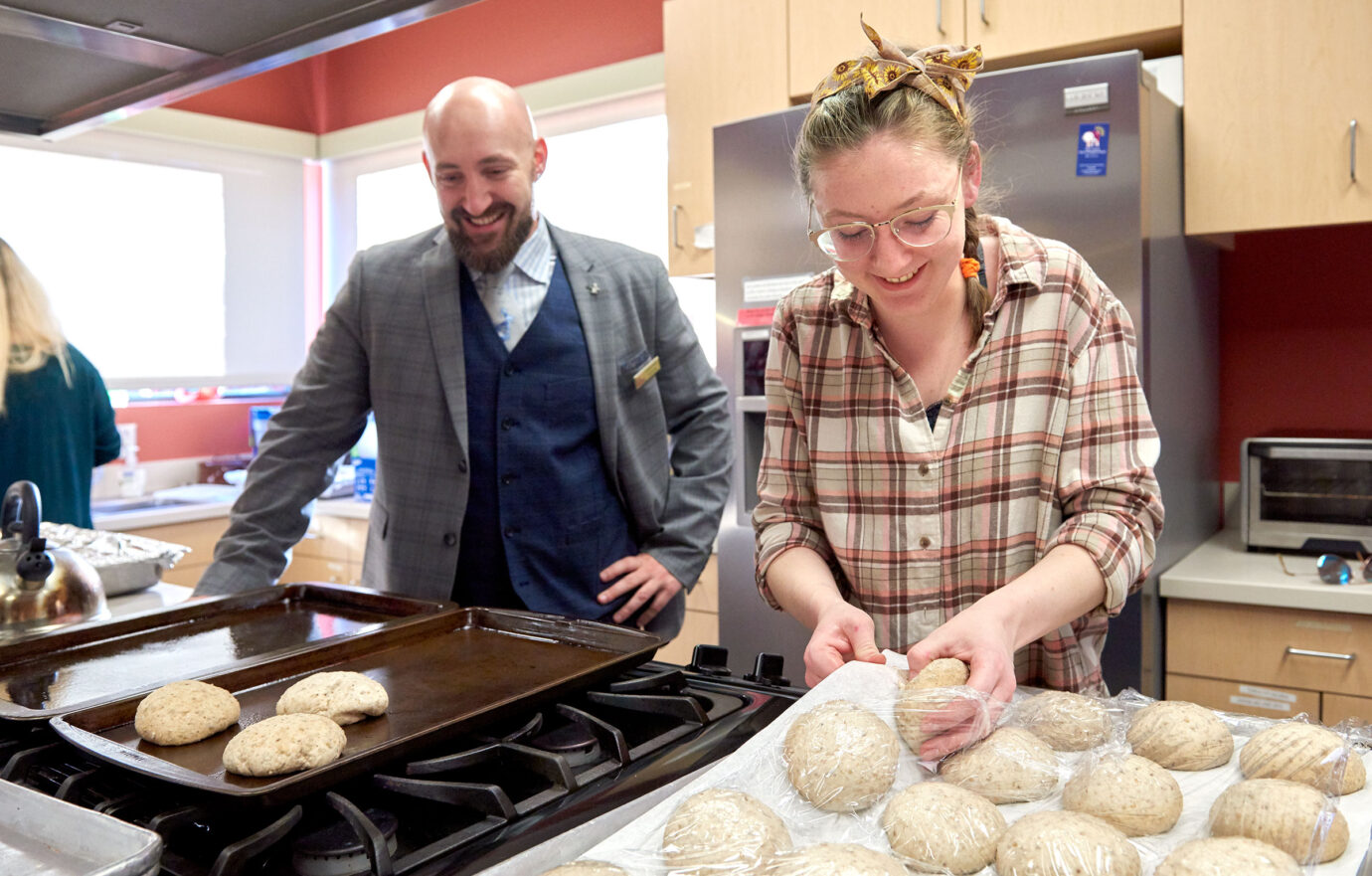
Walnut Hill College’s Associate Dean of Teaching and Learning, Joshua Seery looks on as and Walnut Hill College Pastry Arts student, Meg Linck prepares dinner rolls in the kitchen at the Clyde F. Barker Transplant House.
When Walnut Hill College’s Associate Dean of Teaching and Learning, Joshua Seery received a call from then Penn employee Julia Lavenberg, PhD, RN, in the summer of 2018 inviting students to volunteer by preparing meals for families in the Transplant House, he knew the partnership would be a natural fit. Seery is the associate director of the Student Leadership Development Institute (SLDI) at Walnut Hill College. The SLDI is a program dedicated to developing and supporting the growth of future leaders in the hospitality industry. With the help of student leaders from the SLDI program, House guests would get to enjoy healthy meals, and students in hospitality training would have an opportunity to perfect their recipes and service while giving back to a good cause.
“One of the core values of our program is community outreach,” Seery said. “I’d been looking to do something with and for the community, so I felt this was a win-win. And it’s been fantastic; the impact has been more than I could’ve expected.”
The partnership is supported today by a Penn Medicine CAREs grant and the Penn Transplant Institute. With the program’s first CAREs grant, awarded in October 2018, Walnut Hill College students hosted their first few meals, providing soup and homemade bread to House guests. The collaboration was a huge success; both families and students raved about how much the program meant to them and said they didn’t want it to end, but the initiative still lacked consistent funding to support the purchase of food.
In December 2018, the Penn Transplant Institute committed to funding the partnership for the remainder of the 2018–2019 academic year. The Transplant Institute’s support allowed students to coordinate even more elaborate meal events for Transplant House guests, including three-course meals with specially themed recipes and decor.
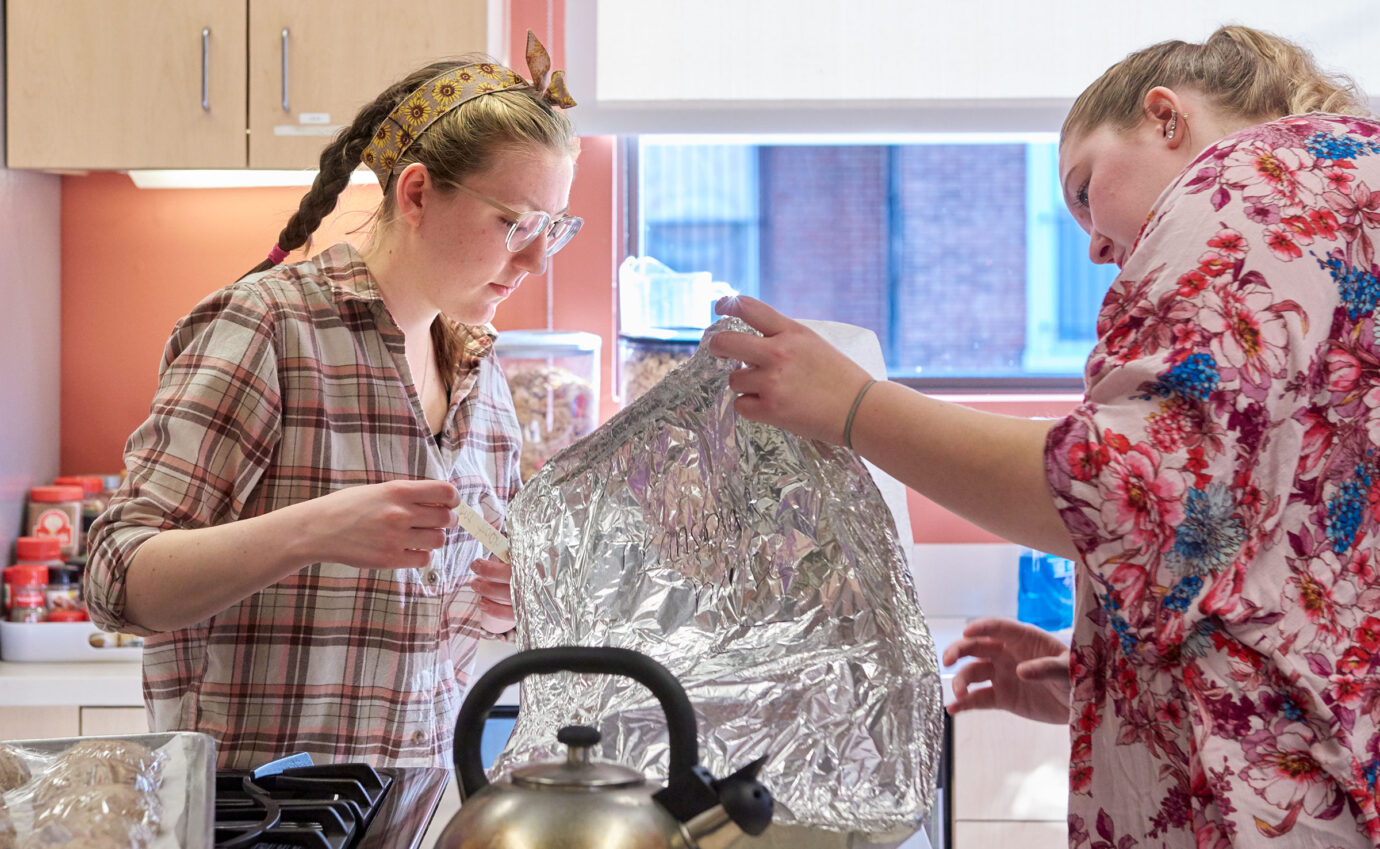
Walnut Hill College students, Meg Linck and Megan Young check to see if a shepherd’s pie is ready to serve to Clyde F. Barker Transplant House guests.
Students do all the prep work and cooking for each event, incorporating lessons learned in the classroom to make healthy meals for House guests. But their participation goes beyond the art of cuisine. Students are responsible for working with Seery to create and manage a budget, purchase food at wholesale prices, and calculate the cost per serving for an average of 30 guests—all skills that will be vital to their success in the hospitality industry. More importantly, Seery says, students learn valuable life lessons through the experiences of Transplant House guests.
Not every caregiver who stays at the Transplant House has a family member who survives the transplantation process. Some succumb to their illness while awaiting a compatible donor organ and others are often so ill, they become totally dependent on spouses and family members to provide their daily care.
“The students do an incredible job doing the menu and curating the recipes, but it really can be an emotional experience,” he said. “Seeing people going through these trying times and still being positive, it gives all of us a different perspective on life.”
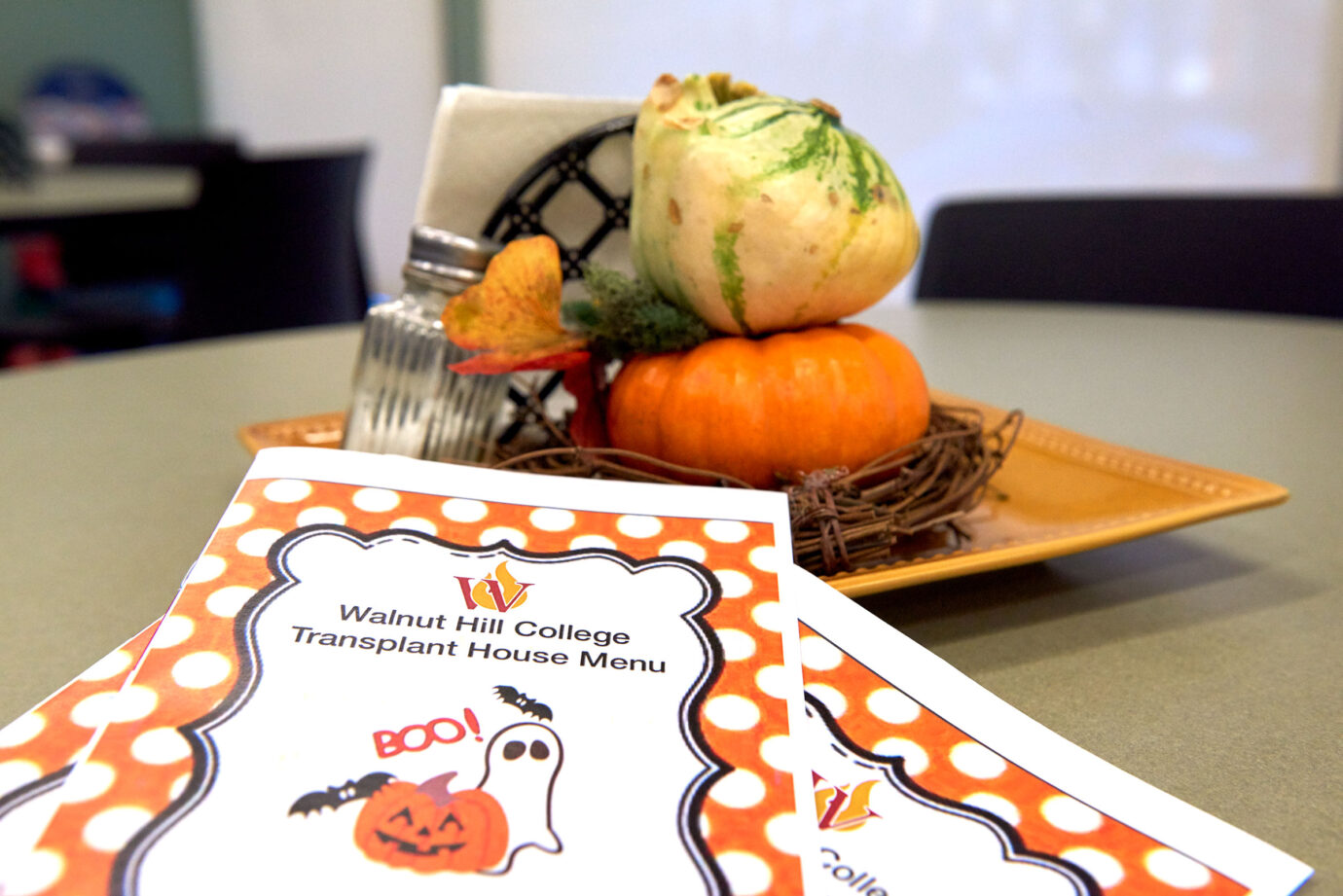
To help Clyde F. Barker Transplant House guests celebrate Halloween, student volunteers from Walnut Hill College decorated the communal dining hall with harvest décor and menus for a specially themed meal.
Late in the Fall of 2019, students worked together to create a specially themed meal to help House guests celebrate Halloween and harvest time. It would be their sixth time hosting a meal since the partnership began.
On this cool October night, student volunteers made a three-course meal of butternut squash soup, homemade dinner rolls, shepherd’s pie, and spooky, Halloween-themed fudge brownie cupcakes, complete with edible fondant spiders on top. To make the dinner rolls, one student used a recipe from a breadmaking course they’d taken at the Walnut Hill College. Another used a personal family recipe for the shepherd’s pie. And for the cupcakes, one student took inspiration from a recipe by Martha Stewart.
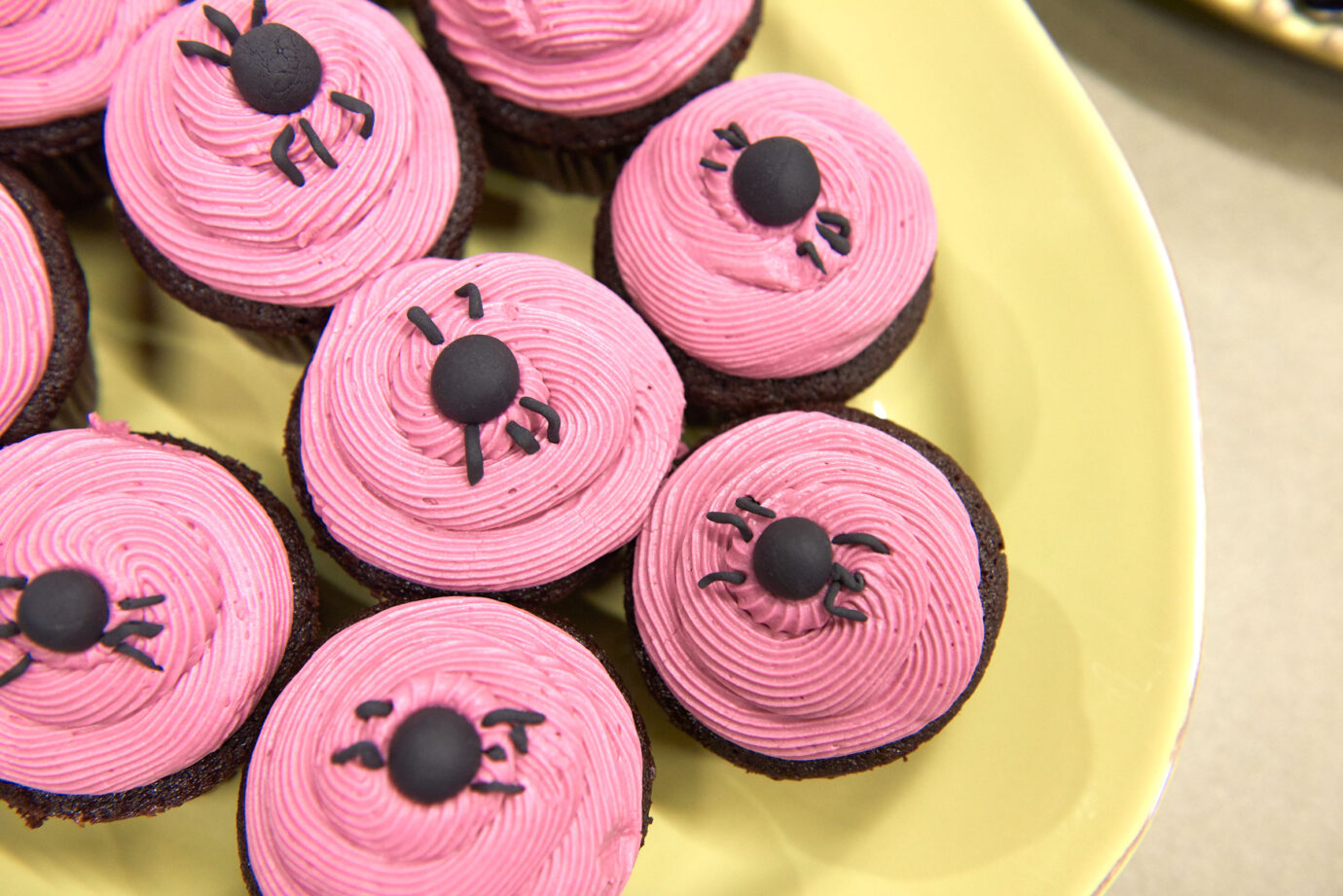
Walnut Hill College students prepared a three-course meal of butternut squash soup, homemade dinner rolls, shepherd’s pie, and spooky, Halloween-themed fudge brownie cupcakes, complete with edible fondant spiders on top.
Everything about the meal plan was intentional. Students made goodie bags filled with nut-free candy to avoid triggering any guests with allergies. They even brought an extra gallon of chicken noodle soup for House guests to be able to reheat and enjoy whenever they wanted.
Despite all the hard work students put into the process, they say it’s a labor of love.
“When you’re in class and you’re on a time limit, it’s more stressful to cook,” said Megan Young, a senior in hospitality management at the Walnut Hill College. “Cooking for the families here is a lot of fun. I think it’s a really nice thing to be able to do for people since they can’t be at home with their families.”
“It’s nice to be able to give them something special,” added Kelsey Barker, a junior pastry arts major. “We put love in our food. That’s why it tastes better.”
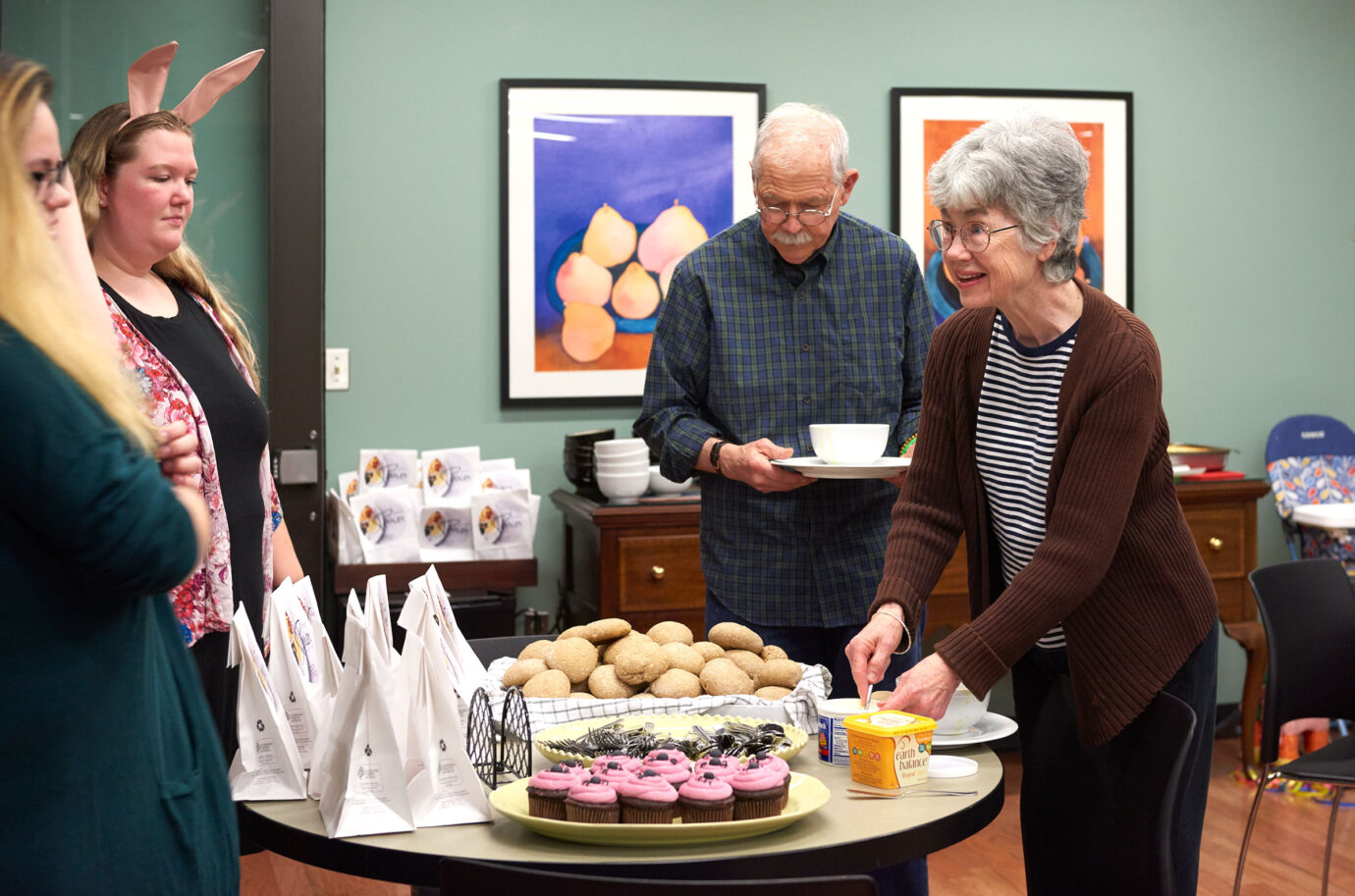
Katherine and Thomas Hayes were delighted to engage with Walnut Hill College students Megan Young and Kelsey Barker during a Halloween-themed dinner night.
As the smell of food wafted up and throughout the house, one by one, House guests began to trickle down into the communal dining room where they mingled with other families and students. Thomas and Katherine were one of the first families to join in the fun.
“The dinner nights are wonderful,” Katherine said. “It’s great to see all these young, enthusiastic students. And they sit with us and we talk and that adds something to the food as well, which is just delicious.”
“It’s always delightful. It’s a huge difference from having to go to a restaurant and just hope that you can find something you like. It’s a special experience,” Thomas added. “I’m a baker, so it was also nice to get to talk to the students about the rolls and the other recipes they made.”
Penn Transplant House manager Kirsten King says the fellowship between volunteers and House guests is what truly makes the program unique.
“We ask groups to not just come and make a meal, but to share in the meal alongside the guests and get to know them,” she said. “It is a really enriching experience for both the guests, who are touched to be thought of and cared for so well, and for the students who get to hear about the transplant experiences of the guests. The deep empathy it offers the guests and the perspective it offers the students are invaluable.”
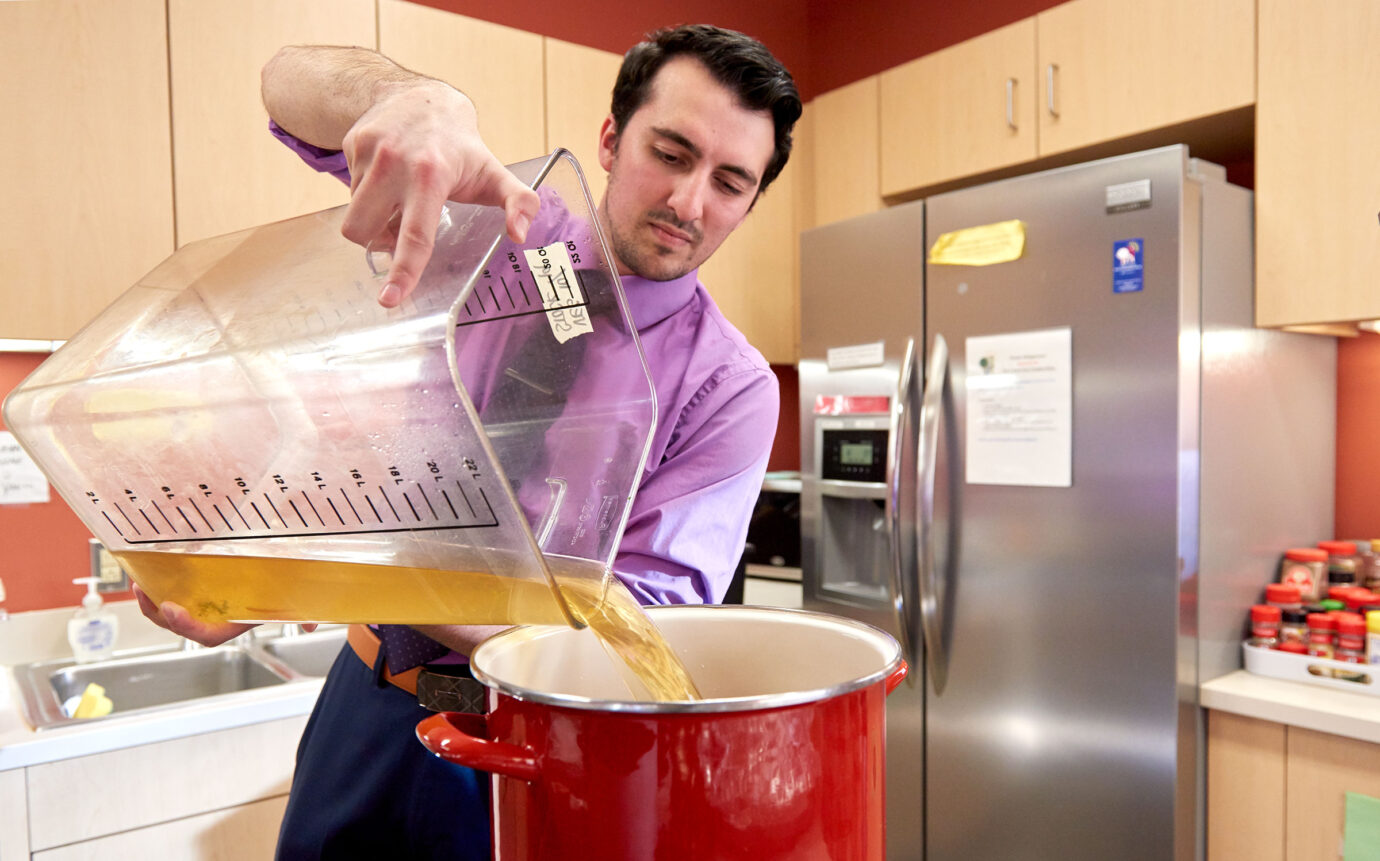
Walnut Hill School Senior Hotel Management major Joshua Reilly stores extra chicken noodle soup for Clyde F. Barker Transplant House guests.
Senior hotel management major Joshua Reilly says he’ll never forget the people he’s met at the Transplant House.
“The best part of the program has been meeting the people,” he said. “The residents are always so humble and down to earth, despite what they’re going through. They have the most amazing stories.”
Thomas received his lung transplant in July 2019. Like all transplant patients, he has returned to HUP for multiple follow-up visits to ensure the organ doesn’t reject. The couple doesn’t yet know how many visits remain for Thomas, nor do they know how well his body will adjust to the new organ. But they do know that whenever they need to return, they’ll aim to stay at the Transplant House again.
“We’ve been very lucky so far. Tom has done pretty well in testing through all the milestones that he has had this past year. But there are other people who really have it rough; their loved ones are still in the hospital or they’re not doing as well,” Katherine said. “So, it’s nice to have a light moment over a meal. It creates that kind of comfortable feeling. The Transplant House feels like home and that’s a part of healing.”
The Penn Transplant Institute recently committed to continue funding the program for the duration of its existence—as long as Walnut Hill College students are willing to participate, the Transplant Institute has promised to provide the funds they need.
“It is the awesome care, intentionality, and enthusiasm shown by the students, and all our volunteers, that continue to make these partnerships and programs a success,” King said. “This program has been such an awesome opportunity to grow awareness around the importance of organ donation, personalize the transplant journey, and showcase the impact a community can have.”





 Comfort Food to Heal the Soul
Comfort Food to Heal the Soul




